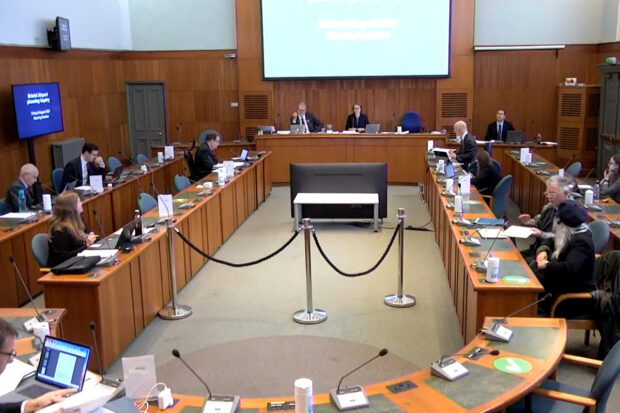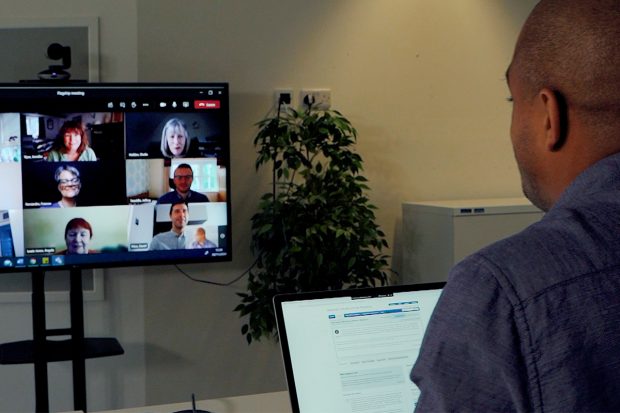
Rebecca Phillips (Professional Lead for Planning Appeals) writes about the future of casework events and reflects on what we’ve learned from the Covid-19 pandemic when our hearings and inquiries moved online. Rebecca leads the work to create a sustainable and robust ‘operating model’ for the future.
When the Covid-19 pandemic brought a halt to physical contact, we adapted by moving our casework events online and running them completely virtually.
By “casework events”, we are talking about the hearings and inquiries that the Inspectorate holds for planning and other types of appeals, national infrastructure applications and local plan examinations.
Like the rest of the world, our reliance on video conferencing surged. But, as Martin O’Brian our Head of Digital Services set out in his blog in May, what started as a short-term response to keep our casework moving during the COVID-19 pandemic has accelerated our ambitions to be a more digital and innovative organisation.
With COVID restrictions now lifted, we have handed back the practical running of events to Local Planning Authorities, which can now include face to face elements.
Whilst we have been adapting to changes in COVID restrictions, my team at the Planning Inspectorate has been working to develop a new operating model for events using insight gathered from extensive research.
Our goal is to build a sustainable model for the future that:
- is accessible for all parties involved and offers opportunities to improve equality, diversity and inclusion in our events
- ensures we maintain our values of fairness, openness, impartiality and customer focus
- meets our public sector equality duty responsibilities
- meets our environmental policy requirements
Our research
Over the summer, we conducted research with staff for an internal perspective. Our staff are clearly central to the model that we develop, and inspectors are the ones reviewing the evidence and should have a say in how that evidence can and should be heard.
We have considered the needs of others involved at events (such as appellants, legal professionals, local planning authorities and interested parties). We have been collecting ongoing feedback from participants of virtual events and to complement this we commissioned the Royal Town Planning Institute (RTPI) to conduct further research on our behalf.
As the only body in the UK that confers Chartered Status to planners, and with over 25,000 members in the private, public, academic and voluntary sectors, the RTPI was ideally placed to use their expertise and research to bring evidence and thought leadership to shape planning policies and thinking.
We asked the RTPI to conduct research with a wide range of stakeholders and make recommendations to inform our future operating model.
This technical note accompanies the following key findings and sets out the survey data limitations.
Key findings: A strong case for virtual events having a permanent role
The findings from approximately 300 Planning Inspectorate staff revealed:
- unanimous agreement that both physical and virtual events had a role to play in the future
- agreement that some aspects of virtual events worked as well virtually as physically (e.g. the case management conference, technical and procedural discussions, final submissions)
- over 8 in 10 inspectors believed that the formal process of taking the oath and giving evidence under oath should be in person
- staff recognise the benefits virtual events provide in terms of flexibility and organisational resilience if further mobility restrictions were imposed in future
Our ongoing customer research from approximately 600 event participants tells us:
- nearly all participants indicated they were able to successfully participate in an event
- over 6 in 10 would prefer either purely virtual or a mix of virtual and physical events
- nearly 9 in 10 agreed that holding the event virtually did not affect the running or outcome of the event
RTPI’s research and analysis of our customers’ and stakeholders’ views found that:
- overall virtual events had been a major success, whilst there were some challenges with the adoption of virtual events these have been minor and could be addressed
- holding hearings and inquiries virtually improves accessibility and encourages public participation
- there is an appetite to have virtual events as the default method
- the format of the event should be decided on a case-by-case basis with the inspector consulting the parties to decide on the best format
- feedback from legal professionals indicated that virtual proceedings did not impact the effectiveness of cross examination (other than the testing of evidence on oath) and whilst they did identify some issues with virtual events, they acknowledged their overall success
The RTPI report recommends that virtual events should form an integral part of the operating model going forward, but the format of the event should be decided on a case-by-case basis.
What next?
Over the next few months, we will be developing and testing scenarios based on the themes emerging from the research.
Following adoption of our environmental policy, we are carrying out an environmental impact assessment against each of the scenarios to inform our recommendations.
These will feed directly into the development of our future operating model.
This model will incorporate process and guidance on how and where a hearing or inquiry takes place. This will cover virtual, blended or face to face, taking into consideration the factors like:
- the needs of different parties
- availability of technology and venues
- any legal considerations including our responsibilities under the Public Sector Equality Duty
We will be sharing our new operating model in early 2022.

Leave a comment